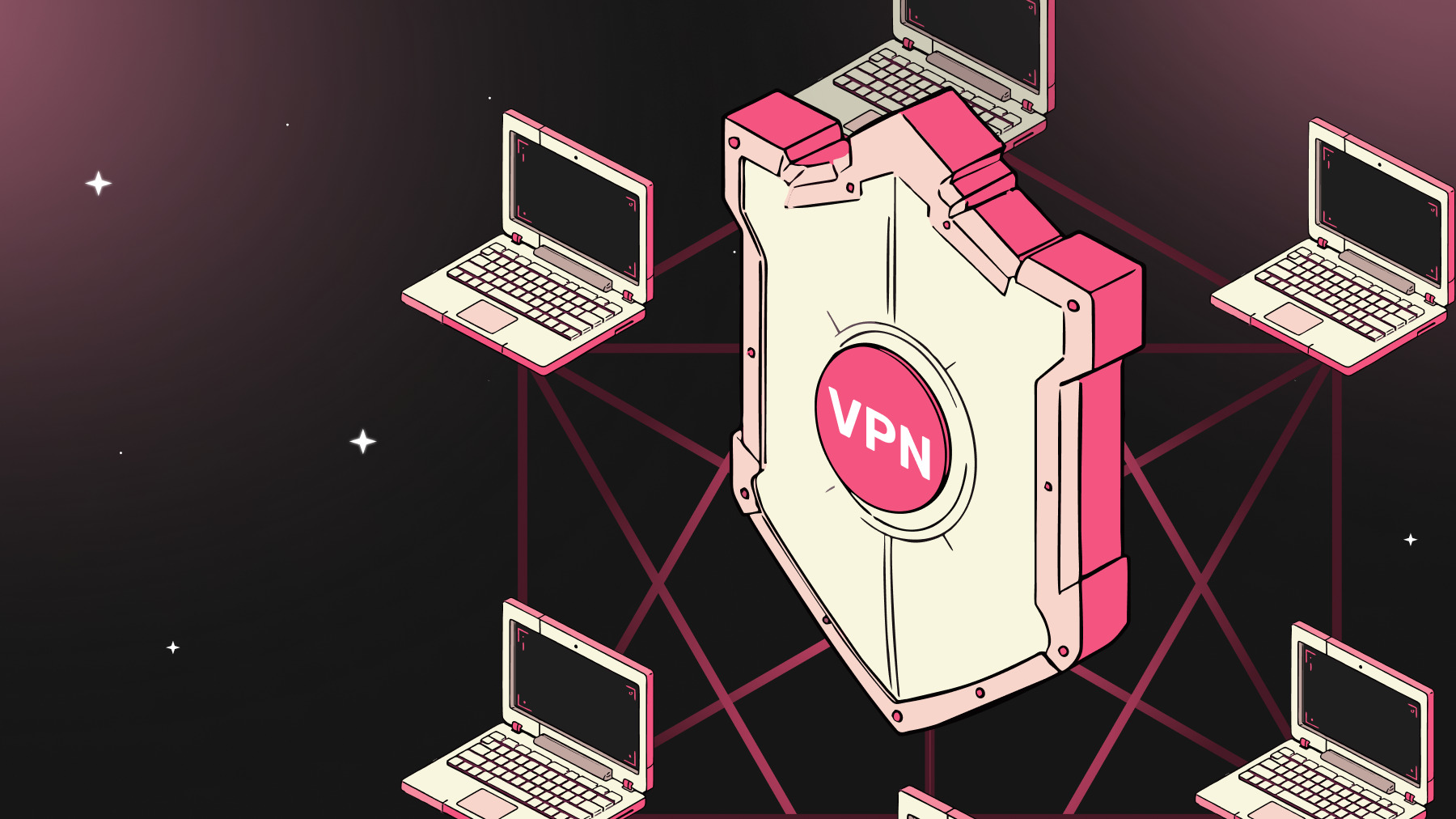What Is a Decentralized VPN? Is It Better Than a Regular One?

Technology is advancing rapidly, with new innovations emerging constantly—including in the VPN space. Decentralized VPN (dVPN) is one such innovation.
- The idea is fresh, but what’s the essence of it?
- Is it better or worse than a traditional VPN? How does it work?
- Why are users embracing this type of VPN as a lifeline for privacy?
- What makes it an alternative method of protection?
We’ll explore these questions and more in this article.
A decentralized VPN, or dVPN, is a new form of data protection that operates on entirely different principles compared to conventional VPNs. It’s still a VPN, but decentralized. While some are accustomed to traditional methods, new technologies reveal a different perspective: the enhanced security of a network with no center, no single point of control, and seemingly no predictability.

Diving into the World of VPNs
What is a VPN, and Why Do You Need It?
A VPN is a secure tunnel within the internet—a private network inside of a public one, encrypted and protected. It all started in corporate offices, where VPN technology addressed two key needs: securing employee data and enabling remote access to office computers. Initially, VPNs served business purposes, only later becoming a tool for personal use.
Animation of how VPN works (packet transmission):
User device
VPN client
Encrypted
Internet provider
Encrypted
VPN server
Internet
User device
VPN client
Internet provider
VPN server
Internet
How Does a VPN Work?
A VPN hides your location, simulates a different access point, and encrypts your data. Some use VPNs to bypass geo-blocks, others for privacy. But traditional VPNs don’t solve the trust issue: the server is a vulnerability, a single point of failure that can be controlled by the service provider. The alternative? Decentralization.
The Evolution of VPNs: Introducing Decentralization
The cutting edge of VPN technology today is moving from centralization to distribution. VPN service is provided by multiple nodes with no single owner. Users can become part of the network as service providers, transforming from a service into an ecosystem.
In a classic VPN, the servers belong to a company. In a dVPN, individual users’ devices act as servers, contributing resources. The absence of any central authority, management, or control is one of the benefits of decentralization. Another key benefit is that even if one node goes offline, the network remains operational. dVPN has shown itself to be the superior new approach to internet privacy.
How Does a Decentralized VPN Work?
Technology in Service to Security
Blockchain plays a crucial supporting role in decentralized VPNs (dVPNs), enabling a transparent and secure payment system between network nodes. The connection to a dVPN service operates within a distributed P2P network, where clients and providers exchange traffic directly. Here, blockchain serves as a tool for organizing decentralized payments, recording transactions between nodes.
Some dVPN solutions use smart contracts to automate transactions: when one node grants access to another, the contract verifies the terms, confirms fulfillment, and logs the transaction on the blockchain. However, not all dVPN networks rely on smart contracts—some prefer to use conditional transactions to define interaction rules and record the services provided.
Simplifying the Process:
Let’s break it down step by step:
1. Connecting to a dVPN
It all starts with registering a node in the decentralized network. A device sets up a node, which becomes part of the peer-to-peer (P2P) network. Information about the new node is then recorded on the blockchain.
2. Establishing a Connection
When a client connects to a dVPN, their device finds the nearest node and establishes a direct connection with it. All traffic is transmitted within the P2P network—without involving the blockchain.
3. Recording the Interaction
Although VPN traffic flows directly between nodes, information about the interaction (connection details, data volume) is logged on the blockchain. This data is validated either by all network participants or selectively, depending on the consensus mechanism.
4. Rewarding Participants
The reward system operates on two levels: Payment to the provider – The node that supplied the VPN service receives payment in tokens directly from the client. This is a blockchain transaction. Validator rewards – Nodes that verify and record transactions on the blockchain also receive compensation for their work. This process is fully automated and secured by blockchain mechanisms, eliminating any possibility of data tampering.
This is how a dVPN works: secure, free from central control, created by users in a peer-to-peer network.

Why Is a Decentralized VPN Better Than a Traditional VPN?
Efficiency and Reliability
A centralized system is as vulnerable as a lock with a single bolt—one strong pull is enough to break it. Decentralization works differently. There’s no single door, no master key. A decentralized VPN has no central server that can be attacked, shut down, or hacked.
Imagine a regular VPN with one server: The server gets overloaded → your speed drops. The server goes offline → your connection is lost. A dVPN works differently. If one node fails, the network automatically reroutes traffic. It’s like an anthill—remove one ant, and the colony survives.
Example: Centralized VPNs often struggle in censored regions like China or Iran. Blocking one server is easy, but blocking thousands of scattered nodes worldwide is nearly impossible. The reliability of a dVPN lies in its adaptability and resilience.
Cost Efficiency
A traditional VPN is a business. Owners invest millions in infrastructure—servers, maintenance, app development—and the end user foots the bill.
A dVPN operates differently. Users contribute their own resources—their devices, their bandwidth—reducing costs. There are no expensive servers, no recurring infrastructure expenses.
dVPN services are cheaper, sometimes costing mere pennies—especially if a large number of users participate in the network and earn rewards for sharing resources. Instead of funding massive data centers, the network shares its collective power.
Blockchain as the Foundation
Blockchain in a dVPN is like the steel frame of a skyscraper—without it, the whole structure collapses. Blockchain ensures: Transparency – Records can’t be erased or falsified. Security – Every connection and data transfer is logged without exposing user activity.
Some dVPNs use smart contracts to automate payments, while others (like KelVPN) rely on conditional transactions with similar functionality. Funds are locked in the client’s account and automatically released to the provider after service delivery, with no intermediaries.
Your actions stay protected: No node can identify you, trace your traffic, or see its contents.
User Participation
Every node is a real person or company voluntarily joining the system. It’s not just an economy of consumption—it’s a decentralized symbiosis where users simultaneously power the network and access its benefits.
Cryptocurrency Integration
You pay for dVPN services not with a bank card or PayPal, but with cryptocurrencies, ensuring full payment privacy.
But that’s not all. Cryptocurrencies also reward node operators. People who share their devices earn compensation, creating a trust-based economy where every participant gets what they deserve. Everything is transparent and secure.

Privacy and Anonymity Without Compromise
How much data do traditional VPNs collect? Many of them collect registration details, activity logs, and IP addresses. Even if a provider claims "no logs," doubts remain—there’s no way to fully verify it.
A dVPN takes a different approach: No registration, no email, no account needed. Network nodes can’t see your data. Your traffic routes aren’t stored anywhere. True anonymity.
Example: A journalist under surveillance. An activist evading authorities. An ordinary person avoiding corporate data harvesting. For all of them, a dVPN offers privacy without sacrificing convenience.
The Key Idea: A decentralized VPN isn’t just another alternative. It’s the next level of reliability, affordability, and privacy. A future where users aren’t just customers, but part of the network itself.
Additional Advantages of KelVPN
Unique Features and Capabilities
KelVPN is a decentralized VPN with its own proprietary protocol and a multi-layered security architecture. Unlike most services that rely on standard solutions like OpenVPN, KelVPN has developed its own VPN protocol, offering enhanced protection and optimization for decentralized networks.
Additionally, KelVPN employs quantum-resistant encryption algorithms, safeguarding data even against threats from quantum computers.
The service allows users to select specific nodes, which allows them to connect to a desired country for content access. Despite its advanced technology, KelVPN provides an intuitive interface, suitable for both experienced users and beginners.
Decentralized VPN vs. Traditional VPN
A comparison based on security, cost, and convenience
| Criteria | Traditional VPN | Decentralized VPN |
|---|---|---|
| Security | Depends on the provider. Potential for log leaks. | High, due to no centralized storage. |
| Cost | Expensive (server maintenance). | Lower (distributed resources). |
| Convenience | User-friendly, ready-to-use apps. | Requires initial setup but improving. |
Tor vs. Decentralized VPN
Both Tor and dVPN are anonymity tools, but their approaches differ. Tor was designed for anonymous browsing, while dVPN focuses more on reliable connections and security.
| Criteria | Tor | Decentralized VPN |
|---|---|---|
| Anonymity | High, but vulnerable to malicious nodes. | High (distributed network). |
| Speed | Slow (multi-layered encryption). | Faster (efficient routing). |
| Transparency | Unknown node operators. | Nodes are verified & rewarded. |
No-Log Policy vs. Decentralization
Many VPNs advertise a "no-logs" policy, but this isn’t a guarantee. Under legal pressure, providers might secretly start logging data without user consent.
In a decentralized system, this risk is eliminated. Logs simply aren’t stored. Nodes only see fragments of traffic, and routing through the network makes it impossible to trace a user’s activity chain.
Making an Informed Decision
Key takeaways from this article
A decentralized VPN offers:
- Enhanced security
- Anonymous cryptocurrency transactions
- Reliability with no single point of failure
KelVPN stands out with its quantum-resistant encryption, flexibility, and affordability. If privacy, security, and modern data protection matter to you, the choice is clear.

